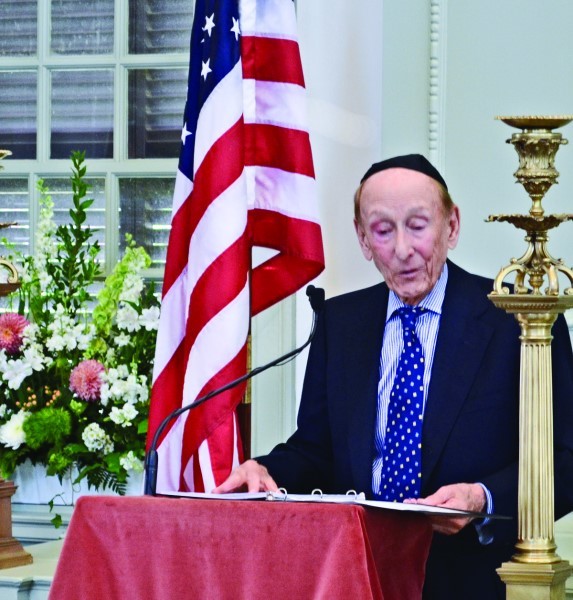226 years later, Washington’s words resonate
A few days after visiting Newport in August 1790, President George Washington sent a letter to the area’s Jews affirming one of the key principles of the new nation: religious liberty. And, 226 years later, New Englanders still gather in Newport every year to hear Washington’s words.
This year, on Aug. 21, Newport’s Touro Synagogue was once again filled with speakers, community leaders and residents from all spheres of life, all awaiting the 69th annual recitation of Washington’s letter, which still resonates today.
The recitation has grown into a community gathering and awards presentation reinforcing of our first president’s support for religious liberty.
Resident Imam and Scholar Mufti Ikram ul Haq, from Masjid Al Islam, in North Smithfield, spoke right before the Artillery Company of Newport, in Colonial garb, carried flags up to the small bimah at the front of the sanctuary. Words of support followed from Jeanne-Marie Napolitano, mayor of Newport, and Nellie Gorbea, Rhode Island’s secretary of state.
“Rhode Island actually started it all … in today’s Rhode Island we must reflect that same commitment to religious liberty and the diversity of our citizens, and to welcome all,” Gorbea said.
“Our best public policies come from respecting others’ opinions. Newport in particular was the center for all this,” she continued, as she asked those in attendance to reflect on how they can continue to preserve religious freedom.
Following Gorbea, R.I. Sen. Sheldon Whitehouse highlighted the importance of the famous line from Washington’s letter, “to bigotry no sanction, to persecution no assistance.”
The event also featured the presentation of the Slom Scholarship Awards, which, according to Touro’s website, recognize high school students who “submit an interpretive work focusing on the George Washington Letter to the Hebrew Congregation in Newport, R.I., in context with the present time,” and the Alexander George Teitz Award, “given annually to an individual or institution that best exemplifies the contemporary commitment to the ideals of religious and ethnic tolerance and freedom.”
Recipients of the Slom scholarship were Halle Duggan and Colin Martin, of Newport; Connor McGill, of Westerly; Elena Miceli, of Exeter; and John Fanelli, of Princeton Junction, New Jersey.
The Alexander George Teitz Award went to the Four Faiths Organization, which organizes tours of four of Newport’s key religious sites, for its “lively experiment with religious freedom.” Andrew Long, the outreach coordinator of Newport’s United Congregational Church and a key organizer for Four Faiths, accepted the award.
After the awards presentations, Massachusetts state Sen. Michael Rodrigues, a member of the Azorean Jewish Heritage Foundation, read the Aug. 17, 1790, letter from Moses Seixas, warden of the Hebrew congregation at Touro Synagogue, to Washington. In the famous letter, Seixas gives thanks for the “Blessings of civil and religious liberty” in the new nation. Lawyer Gary P. Naftalis then read the George Washington letter.
The keynote speaker was Wesley J. Fastiff, of San Francisco, chairman emeritus of the board of Littler Mendelson P.C., a law firm that specializes in employment and labor law. The son of two immigrants to Massachusetts, Fastiff said his parents were in the fruit business and, through hard work and diligence, were eventually able to open their own store in Fall River.
After acknowledging the importance of Washington’s phrase “to persecution, no assistance,” Fastiff turned to another part of the letter.
“Another phrase, found in the last sentence, caught my attention: ‘occupational liberty’ stood out for me,” Fastiff said. “ ‘Scatter light and not darkness upon our paths,’ ” he quoted, “ ‘and make us in all our sub-vocations useful here.’ ”
“President Washington recognized that opportunity in the form of occupational liberty … is a true component of religious freedom,” said Fastiff, noting that in 1790 this concept was revolutionary, especially for Jews.
Since Colonial times, Fastiff continued, occupational liberty has grown through such equality laws as the Americans with Disabilities Act of 1990 and the Equal Pay Act of 1963. Washington’s notion of occupational liberty, he said, is “stronger today than ever.”
“By fostering diversity and inclusiveness … [we are] expanding George Washington’s visions,” Fastiff said. “We help to make the nation’s workplace both stronger and smarter.”
Fastiff said, with a smile, that he wasn’t going to touch on how Washington’s words relate to the current political campaign in our country – but his silence on the topic still proved expressive.
Fastiff left the audience with a final thought: “The fact that the son of two hard-working fruit merchants has been honored as I have to stand before you today is proof that George Washington’s vision of 226 years ago is still a reality today.”
ARIEL BROTHMAN is a freelance writer who lives in Wrentham, Massachusetts.








